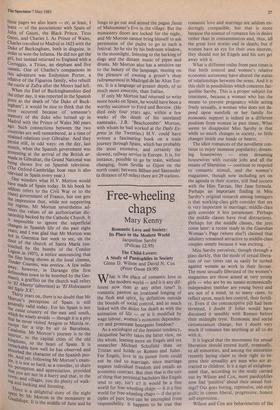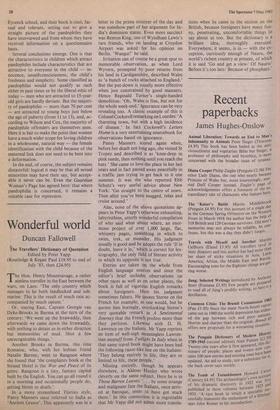Free-wheeling chaps
Mary Kenny
Romantic Love and Society: Its Place in the Modern World Jacqueline Sarsby (Pelican £2.95)
The Child-Lovers: A Study of Paedophiles in Society Glenn D. Wilson and David N. Cox (Peter Owen £9.95) what is the place of romantic love in the modern world — and is it any dif- ferent now than at any other time? Is romantic passion an irrational longing of the flesh and spirit, by definition outside the bounds of social control, and as much linked with the desire for death as with the animation of life — or is it modified by wage labour, women's economic dependen- cry and protestant bourgeois freedom? As a sociologist of the feminist tendency, Jacqueline Sarsby takes the latter view, on the whole, leaning more on Engels and sex researcher Michael Schofield than on Tristan and Isolde or Romeo and Juliet. For Engels, love in its purest form could not be tied to marriage, since marriage negates individual freedom and entails an economic contract. But then that is the sort of thing that perennial bachelors like Engels tend to say, isn't it? It would be a fine world for free-wheeling chaps — it is a fine world for free-wheeling chaps — if the prin- ciples of pure love can be uncoupled from responsibility. It happens to be true that
romantic love and marriage are seldom en- duringly compatible, but that is more because the essence of romance lies in desire rather than in consummation and, thus, all the great love stories end in death; but if women have an eye for their own interest, they should not let Engels and his sort get away with it.
What is different today from past times is that birth control and women's relative economic autonomy have altered the status of relationships between the sexes. And it is this shift in possibilities which concerns Jac- queline Sarsby. This is a proper subject for treatment, because a woman who has the means to prevent pregnancy while acting freely sexually, a woman who does not de- pend upon menfolk or her family for economic support is indeed in a different position from women in past times. What seems to disappoint Miss Sarsby is that while so much changes in society, so little changes inside our heads or hearts.
The idiot romances of the novellette con- tinue to enjoy immense popularity; dream- ing housewives — even dreaming housewives with outside jobs and all the means of liberation — continue to respond to romantic stimuli, and the women's magazines, though now including sex on the agenda in their stories, still find success with the Him Tarzan, Her Jane formula.
Perhaps an important finding in Miss Sarsby's original research among teenagers is that working-class girls consider that sex is very important in marriage; middle-class girls consider it less paramount. Perhaps the middle classes have rival distractions.
Perhaps for the middle classes, the joys come later: a recent study in the Guardian
Woman's Page (where else?) claimed that adultery remained attractive to middle-class couples simply because it was exciting.
Miss Sarsby perceives, though through a glass darkly, that the mode of sexual libera- tion of our times can as easily be turned against women as work in their favour. The most sexually liberated of the women's magazines are those aimed at very young girls — who are by no means economically independent (neither are young boys) and are not of a mind, in so many cases, to reflect upon, much less control, their fertili- ty. Even if the contraceptive pill had been invented, I doubt if Juliet would have discussed it sensibly with Romeo before their midnight tryst. Economic and social circumstances change, but I doubt very much if romance has anything at all to do with it.
It is logical that the movement for sexual liberation should extend itself, eventually, to all minorities, and among the minorities recently laying claim to their right to ex- press their sexuality are men who are at- tracted to children. Is it a sign of enlighten- ment that, according to the study carried out by Wilson and Cox, most paedophiles now feel `positive' about their sexual feel- ings? Out goes boring, repressive, old-style guilt; in comes liberal, progressive, honest self-expression.
Wilson and Cox are behaviourists of the Eysenck school, and their book is cool, fac- tual and tolerant, setting out to give a straight picture of the paedophiles they have interviewed and from whom they have received information on a questionnaire basis.
Several conclusions emerge. One is that the characteristics in children which attract paedophiles include characteristics that are attractive to everyone in the child — in- nocence, unselfconsciousness, the child's freshness and simplicity. Some classified as paedophiles would not qualify as such either in past times or by the liberal ethic of today — men who are attracted to 15-year- old girls are hardly deviant. But the majori- ty of paedophiles — more than 70 per cent — are attracted to young boys just below the age of puberty (from 11 to 13), and, ac- cording to Wilson and Cox, the majority of paedophile offenders are themselves men. Here it is fair to make the point that women have a much wider scope for loving children in a wholesome, natural way — the female identification with the child because of the maternal link does not need to be bent into a deformation.
In the end, of course, the subject remains distasteful: logical it may be that all sexual minorities may have their say, but accept- able it never can be. Even the Guardian. Woman's Page has agreed here: that where paedophilia is concerned, it remains a suitable case for repression.











































 Previous page
Previous page